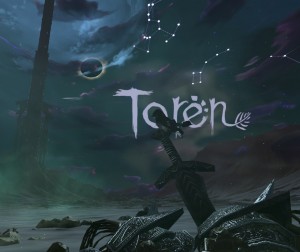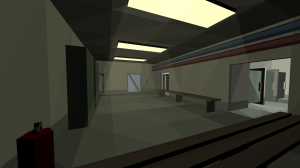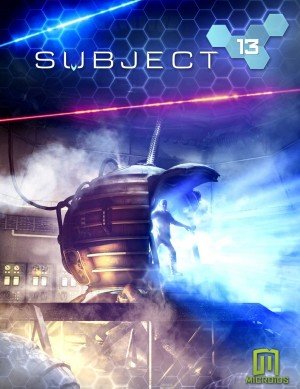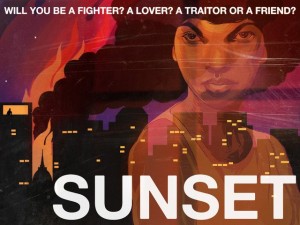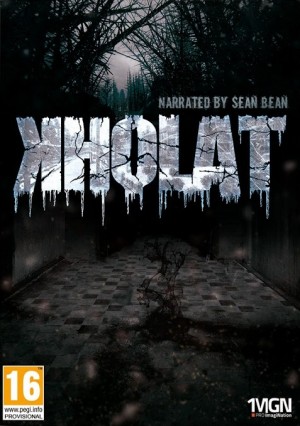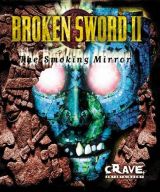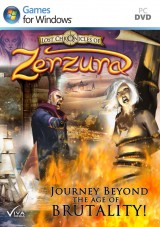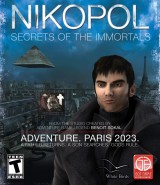Review for City Quest
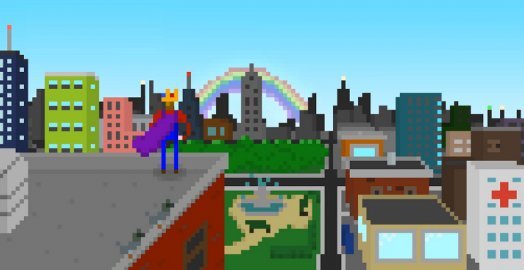
City Quest is not for everyone.
While that statement is true of any game, this indie adventure by Stone Monkey Studios is a journey that you may or may not find fun depending on how much you like humor which pushes the boundaries of good taste in a game whose aim is not to challenge, inspire or captivate, but rather to simply make you laugh. Your amusement mileage in City Quest will definitely vary.
This comedic game was successfully Kickstarted back in 2013 to the very modest tune of $8,739 in public funding. It was designed to be a blatantly retro-styled tribute to golden age Sierra and LucasArts adventures. But while the game certainly captures the look and feel of a classic ‘90s adventure, it regrettably fails to live up to that era’s standards of gameplay and comic fun.
In City Quest, you play the role of an illiterate backwater country hick who has decided to head to the big city for adventure, fame and glory (as well as multiple, inevitable, and horrific deaths.) Stone Monkey (consisting of two-man development team Ryan Nohr and Jon Rasmussen) has done a tremendous job of lovingly creating a pixelated urban wonderland especially reminiscent of Sierra’s classic Quest games – there’s even an option in the settings to make the game look like it’s being displayed on a CRT screen. In addition, the country bumpkin protagonist and the entire eccentric cast of characters have been crafted to look like they would be perfectly at home in Daventry, Lytton, or Spielburg.
Once you step off the airplane which has brought you from Alabamingham, North Texalina, you’re greeted with a brief tutorial illustrating how to play. Foregoing a text parser, at the bottom of the screen City Quest provides four action icons for navigating and interacting: move, inspect objects, manipulate and touch items, and either talk to the inhabitants of the big city or eat (and taste) objects. You have an inventory as well, and can use the hand icon to interact with your collected items. This throwback system of interaction works rather well in City Quest’s simple and whimsical world, though strangely there is no option to cycle the same actions with the right mouse button.
After the brief airport tutorial, you’ll grab a taxi into the heart of the city which serves as the game’s starting area. This consists of just one street with a handful of buildings you can enter (a bar, a hotel, a political headquarters) with a motley crew of folks who offer you various errands to choose from. You’ll have to choose one career path from four different and distinct storylines; you can do all four storylines, but only through replays – once you’ve chosen a path, you’re locked into that story. In the starting area, depending on who you decide to help, you’ll be given the choice to play either as a rising politician, a homeless “hobo,” a member of the mafia, or even a prostitute.
Once you have made your decision, you’ll be whisked away to a new location to begin your adventure proper. In addition to the starting area, the city has eight neighborhoods to explore (you won’t need to explore all of them to complete individual storylines, but you will visit them all if you complete every storyline through replays): suburbia, Hipton, downtown, the docks, a business district, the park, Little Italy, and Little Tokyo. Each usually features two or three streets you can walk through and a number of shops and restaurants to investigate. The areas also display their own particular aesthetic. For instance, Hipton contains a cupcake store and a café, while Little Tokyo has a tattoo parlor and a hibachi restaurant. For a game with such a modest budget and small development team, it’s remarkable how large the game world is.
Depending on the storyline you choose, you’ll be required to complete a number of errands (and basic challenges) to continue advancing your career path’s chosen plot – and as you do, an extremely silly and absurd narrative will begin to unfold with your country hick as the central protagonist. Each story is a truly bizarre tale played for laughs: if you choose the “hobo” path, you’ll end up encountering an extraterrestrial plot with ramifications for the entire planet, while the mafia storyline pits you as a double agent orchestrating a gang war between the mob and the yakuza. At the end of each storyline, you get to choose to decide between a couple of different endings, and I enjoyed exploring the alternate outcomes.
One of my biggest problems with City Quest is that the game can’t decide if it wants to be a parody, homage, or spiritual successor to its adventure game ancestors. The one area that it neither parodies nor pays any tribute to is gameplay. You won’t need to solve any real “puzzles” to advance the story (with one exception), as mostly you just need to speak to the right person or interact with the correct object at the right time. It’s almost always obvious where you need to go. In fact, there’s even a journal you can access to remind you exactly what your next move should be. It’s nearly impossible, for better or worse, to get stuck in City Quest.
In fact, the challenge of the game isn’t in solving puzzles but in collecting the 50 achievements and Easter egg hunting. Achievements can be as mundane as examining 500 objects or by talking to enough people. They can also be as bizarre as collecting all of the discarded infants (each a different ethnicity) scattered throughout the city. One of the features that represents a distinct homage is the numerous opportunities you have to kill yourself, with a corresponding achievement for uncovering all of the ways to shuffle off your mortal coil in each location. (Unlike Sierra games, though, City Quest automatically restarts your game right before you made your fatal mistake.)
I did mention one notable exception. In the hobo storyline, you will need to solve a vintage-style puzzle meant to test your mental worthiness for joining the “hobo” underground. I ran into this early on in my playthrough and expected that there might be more of these. I wasn’t looking forward to more, because it was poorly-integrated and a classic example of a gratuitous puzzle for puzzle’s sake. To be fair, you can choose the “easy version” of the puzzle (but you won’t get an achievement for solving it) if you want to bypass it. That being said, it is the ONLY traditional adventure puzzle in the game.
Instead of puzzles there are a number of minigames throughout, and their level of novelty and successful execution are very inconsistent. I found a couple amusing, especially a sequence where a political debate is rendered as a simple Mortal Kombat/Street Fighter-style combat. Others, such as aiming a water hose at a number of moving flowers to provide a metaphor for coitus, aren’t quite as charming. None provide any level of significant challenge and are meant, as with most of the game, to simply elicit a wry chuckle.
This is where my main problem with City Quest lies – and where your own preferences may come strongly into play. I found that the absurd and silly jokes wore out their welcome pretty quickly. It’s difficult to explain the humor, but it’s an eclectic mix of outrageous, sarcastic, self-referential and bathroom humor. I’d say it’s an oddball remix of the Space Quest/Leisure Suit Larry comedic sensibility with a dash of Portlandia and South Park. Despite the fact that each storyline will likely only take you about two hours, I found the game’s gags (including the constant, ceaseless jibes about the protagonist’s backwater origins and illiteracy) grew repetitive and tired. I could see most of the jokes coming before they were made, and City Quest made me even more appreciative of the elegance of Tim Schafer’s comedic touch.
There are also a number of instances where City Quest pushes the boundaries of good taste into the unnecessarily offensive. Being able to pee on a homeless man’s corpse just isn’t funny. There’s also a “gag” about trying to determine the physical gender of an androgynous artist character that I found to be not only offensive but aggressively unfunny (“I’m just trying to find out if you have wobbly bits or dangly parts.”) I found both of those sequences jarringly crude, which thankfully didn’t seem consistent with the rest of the game. I also wish the script left out many of the popular cultural references. These types of in-jokes usually feel forced – I really didn’t need to run into Jay and Silent Bob loitering outside a store, although I admit I smiled at being able to steal a red stapler from an office desk. I also appreciated that that five classic adventure game heroes are hidden throughout the city as Easter eggs. Of course, there’s an achievement for finding them all (I found three!).
Even if I didn’t always approve of their execution, I was impressed that Stone Monkey provided so many descriptions for City Quest’s wide array of characters, objects and locales. I might not necessarily have loved the game’s sense of humor, but I absolutely appreciated the amount of effort they put into providing consistent detail for their world.
I do have one more nit to pick, as the frequent grammatical mistakes in dialogue and description boxes drove me a bit crazy. I also encountered a couple of bugs during gameplay (including the ability to walk directly up a building’s wall) but nothing show-stopping. The worst was not receiving the achievement for completing all of the game’s storylines.
Okay, I’ve been pretty rough on City Quest so far, but the game absolutely does have a number of things going for it. For starters, the pixelated animations are brilliant. Not only do they provide playful and whimsical action sequences, they also perfectly evoke Sierra’s classic games. I had a visceral feeling of nostalgia watching many of the death sequences because they could absolutely rank with some of the best sequences from Space Quest (I particular enjoyed what happens after taking a dive from the roof of a downtown skyscraper.)
The artwork is also impressive, at least for those with a tolerance of retro-styled design. The developers have turned the restrictions of low-res pixels and a limited color palette into an opportunity to lovingly craft an eclectic metropolis perfect for its farcical stories. Each location is distinctly recognizable and comical, whether it’s a hockey rink, an underground sewer, or an idyllic city park. Just like the amount of effort they’ve put into providing so much descriptive text, they’ve also made sure that no location looks generic. There are even a number of cutscene close-ups which are also impeccably executed (one scene shows the news report of your character’s political debate performance) and completely evocative of similar low-res close-ups in Police Quest.
Composer Akash Thakkar’s score provides the appropriate musical accompaniment for this comedic romp. It features an engaging selection of minimalist synthesizer tracks that present an amusing aural backdrop for each current location and also complements the on-screen action. It’s whimsical, airy, and fun, and takes itself no more seriously than the rest of the game does. City Quest doesn’t feature any voice acting, but in keeping with the retro-vibe, I didn’t miss it.
Comedy is perhaps the toughest genre for any auteur, and how much you enjoy City Quest will be largely dependent on your personal taste in humor. I didn’t find City Quest’s self-aware humor particular funny, nor did I find any of its absurd plotlines particularly compelling, but the game is meticulously crafted to create a visual aesthetic reminiscent of classic adventure games. Unfortunately, it doesn’t even try to capture any of the gameplay and puzzle magic of its forebears.
Even with its comedic misfires, the game is often amusing and can provide a pleasant, nostalgic distraction for a couple hours, though the novelty will have worn off long before you finish off all four career paths if you choose to do so. As a demonstration of Stone Monkey’s talent and potential it’s a qualified success, but when judging the game solely on its own merits, City Quest may have a solid infrastructure but is in need of some serious urban renewal.



_capsule_fog__medium.png)







